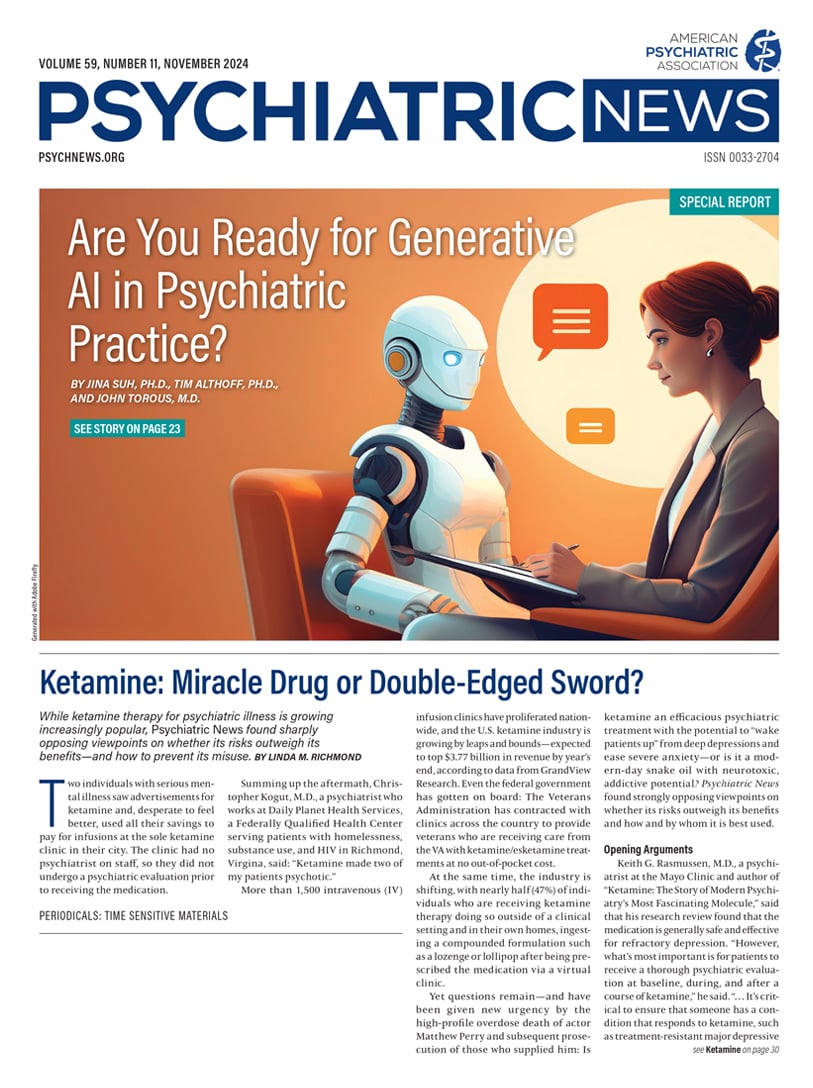Pain is a significant public health issue. It is vital to the overall well-being of our patients. It aggravates and contributes to the development of medical and psychiatric disorders. It can be a major determinant of prognosis. It is for these reasons that pain is often referred to as the fifth vital sign, along with temperature, heart rate, respiratory rate, and blood pressure.
It is of paramount importance that we address this issue in psychiatry. Approximately 100 million Americans suffer from chronic pain, and while pain and its management have become increasingly vital for optimal mental health, frequently the significance of pain is not adequately considered by mental health providers. The intensity of pain experienced and its management is further influenced by factors such as gender, culture, and substance use disorder, with women and minorities tending to receive less care for pain in a number of settings, including but not limited to emergency departments.
Determining Factors
Globally, 1 in 5 adults suffers from pain, which is the most common reason people seek health care and the leading cause of disability in the world. Low back pain has the highest prevalence among musculoskeletal conditions and is the leading cause of disability worldwide, according to the World Health Organization. Chronic pain, defined as pain that persists or recurs for longer than three months, exerts an enormous personal and economic burden, affecting more than 30% of people worldwide. Indeed, even when higher rates of depression, suicide, and opioid use are controlled for, chronic pain is still associated with a lower life expectancy.
Women are a key group with less access to optimal pain management. Often the pain they report is taken less seriously, they have to wait longer on average for treatment, and they experience more intense pain. For example, as reported by The Washington Post, women with acute abdominal pain are 25% less likely than male counterparts to be treated with powerful opioids, while women with chest pain wait 29% longer in emergency departments.
Similarly, quality of pain management is influenced by race and ethnicity. A review of 2012-2014 National Emergency Medical Services Information System (NEMSIS) data suggested that pre-hospital providers are less likely to treat Black patients who experience burns, penetrating injuries, or fractures with pain medication than White patients, and that providers are less likely to use pain medication when treating Black and Hispanic patients experiencing blunt trauma. Additionally, analysis of Oregon NEMSIS data found that Black, Asian, other-race, and unknown-race patients treated for traumatic injury or complaining of pain are less likely to receive pain medication than White patients.
Which Occurred First?
Furthermore, mental health has a significant impact on pain management, and vice versa. People living with chronic pain are at heightened risk for mental health problems, including depression, anxiety, and substance use disorders (SUD). An estimated 35% to 45% of people with chronic pain experience depression (Vadivelu, et al., 2017). Depression and pain frequently co-occur, although estimates of pain prevalence in people with depression vary widely.
Similarly, pain prevalence is high in individuals with bipolar disorder, with approximately 29% of individuals reporting pain—more than double the risk for healthy controls. Meta-analyses of experimental studies show that adults with schizophrenia have elevated pain thresholds and tolerance. However, 35% of them report clinical pain, similar to individuals without mental illness.
Chronic pain prevalence among individuals with an SUD is approximately 60% (Wyse, et al., 2021). Understanding which occurred first might be helpful for treatment of both. One possibility is that patients might be self-medicating chronic pain, ultimately resulting in an SUD. Another is that pain causes stress, and stress makes individuals vulnerable to SUDs.
There is a tendency for physicians to under-medicate individuals with substance use disorder, possibly out of an abundance of caution—because an estimated 10% of chronic pain patients misuse prescription opioids (Garland, et al., 2013). Chronic pain and associated emotional distress are believed to dysregulate the brain’s stress and reward system, thereby increasing the risk for opioid use disorder.
Clearly, pain management is a public health challenge—one that psychiatrists are uniquely trained to confront. We can, and we should. ■

